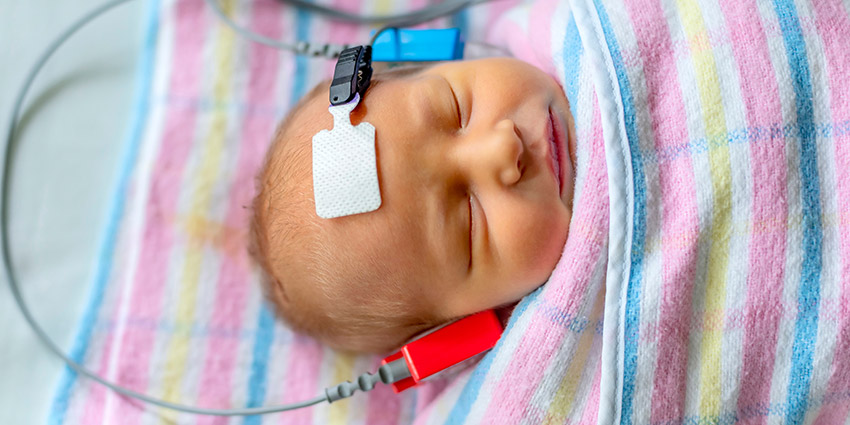When your new bundle of joy finally arrives, you may feel a little overwhelmed with the thought of taking him or her home to care for on your own. But do not fear! Before you and your baby are ready to go home, there are a few screenings that will be completed by the staff to ensure that your newborn is healthy and ready to go.
Although the testing may seem a bit strenuous, screenings before discharge are extremely important to the health and wellness of your baby and in many cases are required by law. Reading up on the benefits these screenings provide, you too will be comforted knowing that your baby is free of certain newborn disorders that can be identified and often controlled with early screening and follow up.
-
Inherited Genetic and Metabolic Disorder Screening
Metabolic disorder screening is typically completed after the first 24 hours of life but may be indicated earlier. The screening will require a stick on the heel of your baby's foot for collection of a few drops of blood. The blood sample is then sent for testing and results are generally provided to your pediatrician after you and baby are discharged from the hospital. Your baby’s doctor or nurse practitioner will notify you of results and discuss any follow up if needed. -
Heart Screening
Just as the disorder screening, the heart screening is completed after 24 hours of life. This screening is used to rule out any Critical Congenital Heart Diseases (CCHD) which affect how the heart pumps oxygen through the baby's body. During the screening, a small sensor will be wrapped around your baby's right hand and either the right or left foot to measure the oxygen levels in the blood. If your baby's oxygen levels are reading low, they may require more testing to further determine if treatment is necessary. -
Hearing Screening
This screening is vital to finding out if your newborn has hearing loss. Just because a baby may seem to respond to a noise by turning their head toward the sound or responding with a startling reflex, it does not necessarily indicate that they can fully hear all of the sounds around them. A hearing screen will be completed before you and your baby leave the hospital so that early detection of hearing impairment can be identified.
Treatment of these hearing losses can help a child with important language and communication skills as they get older Testing will be completed using either a small probe inside of the ear, or earmuffs around the baby' ear. If your baby does not pass their initial hearing screen, it does not mean that they have a hearing impairment. You will then be scheduled to follow up with a hearing specialist for further testing. -
Jaundice Screening
Jaundice is a yellowish tinge in the baby's skin and/or eyes that develops as a result of a buildup of a byproduct in the blood called bilirubin. Oftentimes, a baby's jaundice is minimal and can be cleared with frequent feedings which bring about many, many poopy and wet diapers. If the jaundice is more significant the baby may need treatment. In that case your baby will be placed under special lights to help break down the bilirubin in the skin. Your baby may be tested for jaundice using either a skin probe or a blood sample.
Related Posts

Author
Dalina Walker, RN, MSN, Newborn Nurse
Dalina was born and raised in Virgina where she currently lives with her family. She earned both her Associates and Bachelors of Science in Nursing from Norfolk State University. She then went onto earn her Masters of Science in Nursing Educator from Liberty University. She is a postpartum and nursery nurse who loves to pour into the journey of pregnancy, childbirth, and motherhood.







